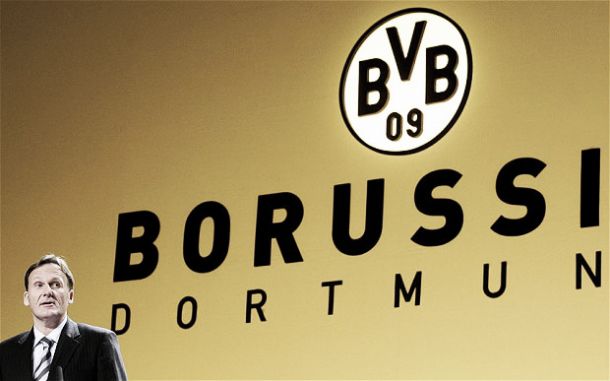"When there is a club, he wants to have the feeling it is my club, not the club of Qatar or Abu Dhabi."– Hans- Joachim Watzke
Germany has really made its blotch on Europe over the last few seasons and some football enthusiasts have focused their attention, which has resulted in them learning that the German Bundesliga seems to do things in the right manner. Germany dominated in the UEFA Champions League last season with their top two clubs gaining access to the Final at Wembley at the end of May 2013. Borussia Dortmund are currently known for their fast fluid game but a nut that can be cracked, whereas Bayern München crippled teams including the mighty FC Barcelona on their UEFA Champions League glory trail. It appears that the German football dominance is on its way back into European football as German shores have struggled in Europe in the past, as the last winner’s of the UEFA Champions League from Germany were Bayern München after beating Valencia of Spain on penalties back in 2001.
Over the last year, ‘Deutschland’ has been the chief subject of dialogue in a number of discussions and the ultimate conclusion is that they come top in every category. There has been request for modification to mainly the English Premier league for their extravagance and yielding players high wages. There has also been debate of ticket expenses with Arsenal charging their own supporters £94 in the game against Bayern München last season in the UEFA Champions League. Football attendances in the English Premier League cannot be compared to Germany’s and above all the German leagues create unique atmospheres that cannot be matched. This account it going to explore those areas in which supporters think are the main ingredients to making their game special and what changes could be made to progress certain leagues around Europe.
Let us start with ticket charges, as this has been a discussion that has never been concluded and somewhat upset devotees of clubs around the United Kingdom because it appears that the famous English game has lost its ‘identity’. There has been a recent protest by Crystal Palace supporters presenting a banner in their home game saying, ‘£55 for Chelsea away, 9 hours minimum wage. Is this the working mans game?’ There is obvious annoyance with many of the English supporters. In comparison, a season ticket standing on the famous ‘Yellow Wall’ of Borussia Dortmund costs an adherent around £154 for seventeen league games with an extra £33 on top for three UEFA Champions League group games. This is alien to numerous supporters around Europe, especially in the English Premier League as the cheapest seat at Old Trafford for UEFA Champions League game costs an adult £40 for one game.
When focussing on the league games it costs an average Mainz 05 supporter €13 to stand to look their team each game and this seems relatively cheap. To add insult to injury, when a supporter pays for a permit for Bundesliga league game, they are entitled to costless public transport to the stadium from a respected distance, something again that would not happen in countless other countries. It will cost a Chelsea supporter £59 for a Premier League game and this is just humbly entry to Stamford Bridge. This is one area that the German Bundesliga cannot be beaten on; they look after their supporters because their supporters are the club.
This flows nicely onto attendances at matches and the Bundesliga has the highest average attendance that was just over 45,000 last season making it the best-attended league in world football. Let alone Borussia Dortmund’s ‘Signal Iduna Park’ holding 80,000 supporters and Bayern München and FC Schalke 04 holding 60,000. In the English Premier League the average attendance was just over 34,000, which is quite low when you hear many English football supporters claiming that it is the greatest league in the world. However, it appears that this has become a bit of a myth due to poor home and away attendances by English supporters in many Premier League grounds.
It has often been noticed on many occasions that there seems to be more empty seats than actual away supporters. Borussia Mönchengladbach reportedly took 10,000 supporters to their away leg in Lazio last season which is astonishing seeing at this was a midweek game. Borussia Dortmund are well known as well for transporting many supporters when they play away and it again was reported that they brought double their allocation to Madrid for their UEFA Champions League second leg last season. This season they took 15,000 supporters to their away game against 1860 München, which is truly tremendous. Some German sustenance cannot be rivalled around the world as the noise and positive atmosphere they accumulate is dumbfounding.
As attendances at matches have been discussed it now only feels right to move onto the stadium advancements in Germany. Many arenas in Germany are very impressive with sites such as the Veltins Arena, Allianz Arena, Signal Iduna Park and the Commerzbank Arena are only a few to mention. Germany has seen ten new stadiums built since the millennium all with safe standing areas that mainly create the unique atmosphere many football fans witness. However it could be argued that this is only because Germany hosted the World Cup in 2006 and the majority of supporters would probably be correct. But many stadiums in Germany have also seen their stadiums be renovated and most famously SC Freiburg’s ground being completely solar powered.
The question asked by many is why have Germany got such good stadiums? The main answer to this is that numerous stadiums are built on the outskirts of the cities in Germany, allowing the football clubs to expand their grounds due to the amount of land they possess. Another reason is that army and aerial forcers throughout the war, which has allowed Germany to build their ground intelligently, will have flattened a lot of the land that was in Germany.
Several English associations have been knocked back when trying to get stadium approval or not able to get the appropriate funding to support them. Everton most notably have been rejected twice when trying to build a new stadium, once for their design at the site at Kings Dock and also their attempts in Kirkby. Liverpool have also not succeeded when trying to get a new stadium and it seems that they have accepted defeat claiming they will try an renovate Anfield. Chelsea is another club that is struggling to get land to build their new stadium as they were recently rejected for site in London.
When looking to finances, it has been seen with many associations around the world and mainly in the English Premier League going into administration due to the overspending on certain players and their wages. Portsmouth is the club that is always on the end of fans lips when overspending is mentioned and there have been very few success stories when a ‘consortium’ has taken over a football club. Blackburn Rovers who were relegated from the Premier League last season have now nearly been relegated again from the Championship but poor organisation and spending extravagantly has cost them dearly. Liverpool is a famous club worldwide but nearly fell into the black hole of administration a few years ago due to their attraction of trying to get to the next level and compete with the likes of Manchester United and Manchester City. QPR could be the next club that could turn out like Portsmouth with the majority of their average players being on high wages.
When moving the attention slightly and focussing on Germany, there are certain rules and regulations that football clubs in the Bundesliga need to follow. In Germany, the '50+1' rule means that its members must own a minimum of fifty-one per cent of a German football club, which means their own supporters. This means that followers associations have a straight say in the organisation of their club, while private business is still able to invest.
When the German Bundesliga became a league in 1963, they put in place a ‘licensing system’ that was intended to remain clubs financially solvent. This means that the German football league look at every Bundesliga clubs finances before each league season. Failure to 'stay fit' could result in the club not having their license renewed and relegation. A recent Bundesliga report released earlier this year, demonstrated that fourteen out of the eighteen Bundesliga teams reported profits. The league reported a turnover of €26 billion for the first time in its fifty year history.
Many leagues around the world and mainly the English Premier League could learn a few things from the German Bundesliga and this account has not even covered the category of foreign players. But that is for another day.









































